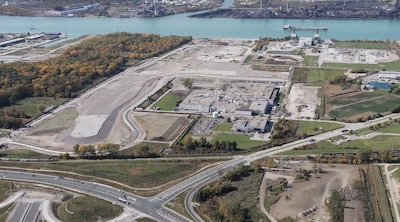 Screen capture of the Gordie Howe Bridge customs and toll plaza along the Detroit River in Windsor.
Screen capture of the Gordie Howe Bridge customs and toll plaza along the Detroit River in Windsor.Due to changing specifications and the complex bidding process, construction of the Gordie Howe International Bridge between Windsor, Ontario, Canada and Detroit, Mich. probably won’t be completed until 2023, the Windsor Star reports. The Windsor-Detroit Bridge Authority informed the three groups competing for the project that their detailed bids will not be required until next year.
Project specifications and requirements have changed, delaying the selection of the contractor and start date of construction, according to information obtained by the news agency. Some of the new requirements — job training, health monitoring, and neighborhood improvements in Delray where the bridge will be located — are included in a $55 million community benefits agreement with the City of Detroit. Separate pedestrian and bike lanes were also added to the bridge design.
The three groups will require additional time to incorporate the additional items into their final submissions, and the bridge authority will probably need until the end of 2018 to select the successful bid and verify the process was properly carried out. The bridge authority will then negotiate a final contract with the winning bidder in 2019, and workers will need to be hired before construction can begin.
With construction estimated to take 42 months, that pushes the anticipated completion date back to early 2023.
“We are somewhat disappointed they won’t meet their milestones on this,” Jim Lyons, executive director of the Windsor Construction Association, which represents local construction and supply companies likely to be retained as subcontractors, told the news agency. “There is likely a good reason. Hopefully, the general public does not panic over this. We are in way too deep on this project for anyone in the federal government to pull the plug.”
Despite the delay, construction could start in late 2018, bridge authority spokesman Mark Butler told the news agency. “We are in constant conversation with the proponents who collectively have over 2,000 people working on their proposals to ensure that the procurement process will yield the best possible proposals,” he said. “The procurement process is ongoing, and we will advise if there are any changes to the established timeline.”
“Certainly there will not be a positive reaction to this — nobody will be happy — but this is not unusual for big projects like this,” Bill Anderson, director of the University of Windsor’s Cross-Border Institute, told the news agency. “Given the complexity and how long this has been going on, you have to keep this (delay) in perspective and (look at the) long-term nature of the economic benefits.”








